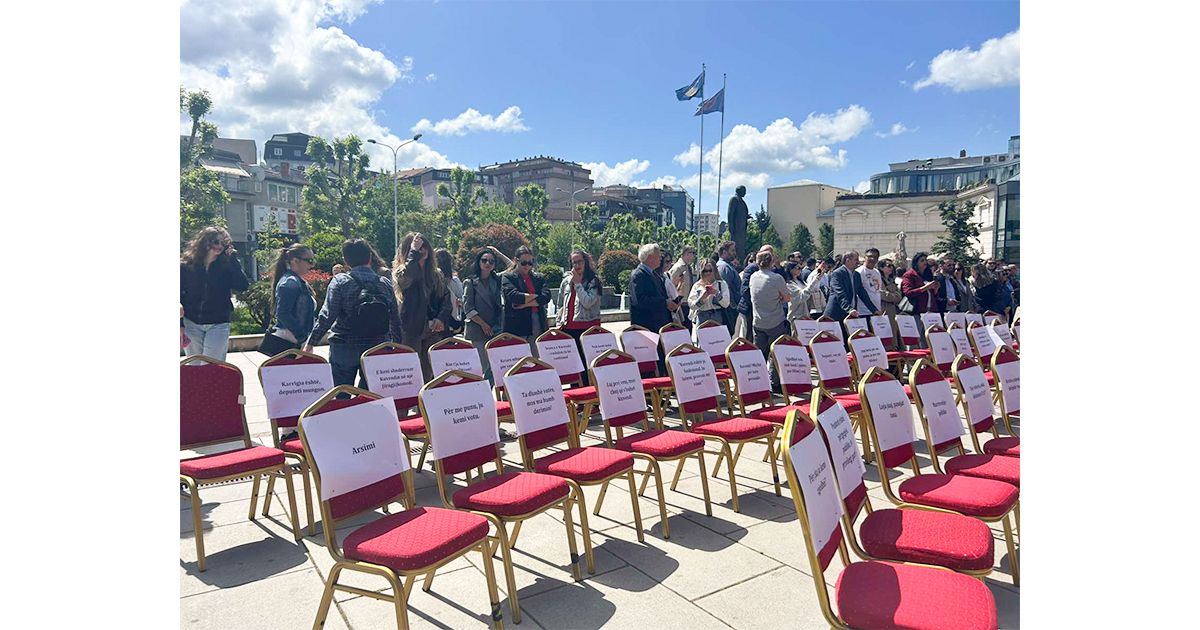Activist Jeta Krasniqi, a member of the Kosovo Women’s Network (KWN) Board from 2017-2020, speaks about the difficulties for women rights activists in 2020, as well as her activism during this time.
She highlights the most important activities and advocacy undertaken by KWN over the years as well.
Virtual Communication as a New Space to Convey Essential Messages
According to Krasniqi, the past year was full of challenges and constant efforts to find ways to overcome many barriers caused by the COVID-19 pandemic.
Nevertheless, Krasniqi continued her advocacy, work and activism, among other things, to improve women’s conditions in society.
She believes that while meetings and direct contact were limited,, the forms of virtual communications established new spaces to convey the essential messages on the pertinent issues activists faced during the pandemic.
“These communications often enabled us to send messages to different countries of the world, including here to local and international actors. Also, to expand the range of influence. “
“It was a year to ‘reinvent’ ourselves, to see what the limits and possibilities are, to give value to family, to each other and to our health. But, above all, a year of reflection and engagement on things we can achieve, inside and outside the country. For me personally, it was a year dealing with issues related to the consolidation of the state of Kosovo, including the Kosovo-Serbia dialogue. On the other hand, it was the war that still needs to be fight to prevent and punish gender-based violence in Kosovo, the gender policies that still need to be created in every sphere of life including addressing the effects of the pandemic – which clearly showed that women were differently impacted than men. Moreover, also the long journey to justice for survivors of sexual violence during the war in Kosovo. “
Justice for Survivors of Sexual Violence
The pandemic situation, emphasized the different forms of digital activism that each of us can and should follow , by combining the various approaches and multiple opportunities to amplify our voices.
“However, direct contact is still needed to break isolation and taboo topics which, unfortunately, still continue to prevail in our society. We saw this with the increasing number of women victims of domestic violence, and in the case of women survivors of sexual violence during the war, whose isolation had a traumatizing effect on them.”
In addition to engaging as Deputy Chair of the Commission for the Verification and Recognition of Sexual Violence Victim Status in Kosovo, last year, Krasniqi also dedicated herself to documenting the twenty-year journey of Kosovo in addressing this war crime.
” Through the initiative of writing a book addressing war crimes, I reflected on Kosovo’s journey by documenting facts about injustice and addressing Kosovo society’s reaction to these crimes. This contribution was very important for me, as an activist who has been directly involved in this issue for many years, and who knows closely the experience of survivors of sexual violence during the war in Kosovo […] ”
KWN Conveys the Message of Women’s Power
Recalling KWN’s contribution to strengthening women’s rights, Krasniqi says that the hidden reality of violence against women behind the doors was brought to town squares thanks to KWN initiatives.
“I believe that KWN conveys an important message- the message of women’s power. KWN has become the voice of victims of gender-based violence, mobilizing society to raise its voice against the murder of women, against unjust court decisions, knocking on the doors of prosecutors, and engaging lawyers using all necessary forms to achieve justice,” she says.
Furthermore, she says that KWN has influenced better gender policies through the continued support of municipalities and Ministries for gender responsive budgeting.
“KWN also managed to break the barriers of representation and speak in the EU institutions about the progress and challenges of Kosovo in guaranteeing gender equality.”
In her opinion, KWN contributed to a better understanding of these issues by our society. They have helped shape numerous local and state policies through research projects that highlight the gendered perspective of topics such as discrimination, harassment, health, education, involvement in politics, economics, security, negotiations and dialogue with Serbia, budgeting for governments, the pandemic, and violence. These analyses allows decision makers to make informed choices, and helps society see both sides of the issue.
“As a network that has raised its voice at every stage of Kosovo’s state-building, KWN has once again made it clear that lasting peace can only be achieved when women are part of the negotiating and decision-making tables. […] ”
Conclusively, she has a message for women who face difficulties during their career.
“Difficulties are part of every journey. The key to success is hard work, patience and consistency. The career path is not a straight line, on the contrary it has many curves, what’s important is that you have to love your job, this makes facing challenges and difficulties easier. Surrendering is never an option, trying again, again, and again is the only option,” she says.
*This article is a continuity of KWN series of publications on the work and contribution of human rights activists in Kosovo.
Read also: The Activism of Besnik Leka During 2020: Challenging, yet Possible



